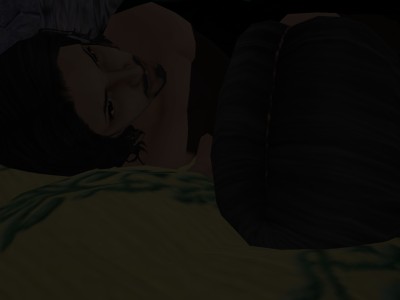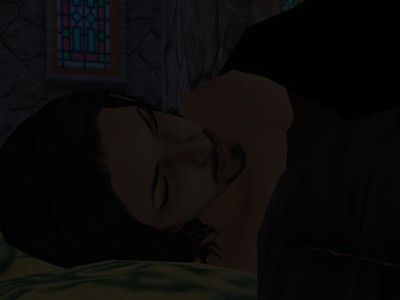
Alred was not asleep. He had waited a long while to be certain that Matilda was, and then he had slid his hand over to hers and cautiously slipped two fingers over her wrist. Now he could feel the race and flutter of her pulse. It was horrifying, but he could not stop himself. It was like a peephole into the turmoil that raged behind the weary repose of her pale, swollen body. But as long as her heart beat, she was alive.
Lately the women were saying that one could only hope that she would live long enough to give the baby a chance to survive. But he did not want it under such circumstances. He hoped it would die with her if she must die.
She did not seem to want it either. She showed no interest in the child. Even her body seemed to reject it, to refuse to nourish it, for it had scarcely grown. It would be sickly if it lived at all.
Nothing was as it had been the other times, with the other children, he thought. He let go of her wrist and curled his body around his knees.

When he wanted to torture himself, he would remember Margaret’s birth, when Matilda had been so certain she would die that she dared reveal to him how she loved him. He had thought that it would have been the crowning point of cruelty to have lost her then. How he had prayed! How he had tried to convince the Lord of this!
Now it would seem that he was to get a lesson in the folly of trying to convince the Lord of anything. He realized now that if he had lost her then, he would not have lost her love. There was scarcely any cruelty in that at all. There was only a short separation. Now, he knew, if he had the grace to make it to Paradise at all, she would not be waiting for him at the gates. The separation would be eternal.
He would have to get up, or he would cry out. He was tired and desperately needed sleep, but he was still far enough from physical exhaustion that he knew it impossible.

He thought he would get Bacchus and go for a ride. If he rode quickly enough across the downs, the wind would swallow that cry and any others. It was the night of the new moon, it was true, but his horse knew the downs by dark as well as by day, and there could be no other danger to him, it seemed, since he was not an elf. And if the strange woman wanted to kill him, too, then so much the better. Perhaps if he were dead, the Lord would no longer wish to kill Matilda.
He slid out of bed and padded over to the chair where his valet had left his clothes. He found he had to walk with his shoulders hunched over, like an old man, so jagged-edged and hot was the cry that was trying to burst out of his chest.
He had just finished lacing his boots when he thought he heard a distant cry that made him forget his own for a moment. He lifted his head and listened. It came again: a shriek that might have come from within the castle or from outside, behind the windows.
He went out into the corridor and waited. The third time he knew it to be inside the castle, and it came down the long hall from the southeast tower. Nearly all of the rooms were empty there when there were no guests. There was only Iylaine.






It makes me so sad to think of how Alred and Matilda's relationship has deteriorated to this point, they were once such a wonderful loving couple.